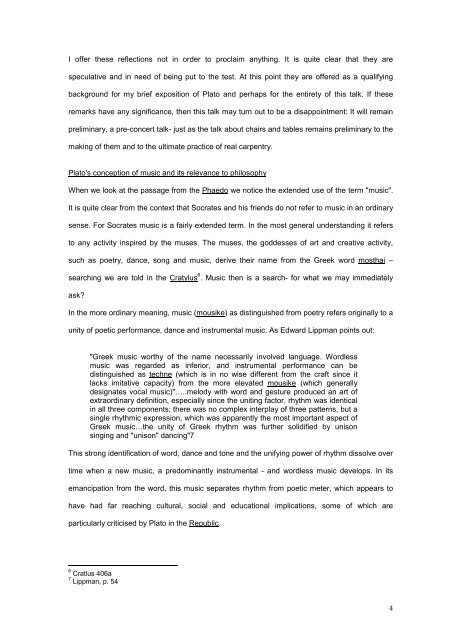Is Philosophy the greatest kind of music? Reflections on Plato's Phaedo 61a
Reflections on Plato's Phaedo 61a (2004)
Reflections on Plato's Phaedo 61a (2004)
- No tags were found...
You also want an ePaper? Increase the reach of your titles
YUMPU automatically turns print PDFs into web optimized ePapers that Google loves.
I <str<strong>on</strong>g>of</str<strong>on</strong>g>fer <str<strong>on</strong>g>the</str<strong>on</strong>g>se reflecti<strong>on</strong>s not in order to proclaim anything. It is quite clear that <str<strong>on</strong>g>the</str<strong>on</strong>g>y are<br />
speculative and in need <str<strong>on</strong>g>of</str<strong>on</strong>g> being put to <str<strong>on</strong>g>the</str<strong>on</strong>g> test. At this point <str<strong>on</strong>g>the</str<strong>on</strong>g>y are <str<strong>on</strong>g>of</str<strong>on</strong>g>fered as a qualifying<br />
background for my brief expositi<strong>on</strong> <str<strong>on</strong>g>of</str<strong>on</strong>g> Plato and perhaps for <str<strong>on</strong>g>the</str<strong>on</strong>g> entirety <str<strong>on</strong>g>of</str<strong>on</strong>g> this talk. If <str<strong>on</strong>g>the</str<strong>on</strong>g>se<br />
remarks have any significance, <str<strong>on</strong>g>the</str<strong>on</strong>g>n this talk may turn out to be a disappointment: It will remain<br />
preliminary, a pre-c<strong>on</strong>cert talk- just as <str<strong>on</strong>g>the</str<strong>on</strong>g> talk about chairs and tables remains preliminary to <str<strong>on</strong>g>the</str<strong>on</strong>g><br />
making <str<strong>on</strong>g>of</str<strong>on</strong>g> <str<strong>on</strong>g>the</str<strong>on</strong>g>m and to <str<strong>on</strong>g>the</str<strong>on</strong>g> ultimate practice <str<strong>on</strong>g>of</str<strong>on</strong>g> real carpentry.<br />
<strong>Plato's</strong> c<strong>on</strong>cepti<strong>on</strong> <str<strong>on</strong>g>of</str<strong>on</strong>g> <str<strong>on</strong>g>music</str<strong>on</strong>g> and its relevance to philosophy<br />
When we look at <str<strong>on</strong>g>the</str<strong>on</strong>g> passage from <str<strong>on</strong>g>the</str<strong>on</strong>g> <strong>Phaedo</strong> we notice <str<strong>on</strong>g>the</str<strong>on</strong>g> extended use <str<strong>on</strong>g>of</str<strong>on</strong>g> <str<strong>on</strong>g>the</str<strong>on</strong>g> term "<str<strong>on</strong>g>music</str<strong>on</strong>g>".<br />
It is quite clear from <str<strong>on</strong>g>the</str<strong>on</strong>g> c<strong>on</strong>text that Socrates and his friends do not refer to <str<strong>on</strong>g>music</str<strong>on</strong>g> in an ordinary<br />
sense. For Socrates <str<strong>on</strong>g>music</str<strong>on</strong>g> is a fairly extended term. In <str<strong>on</strong>g>the</str<strong>on</strong>g> most general understanding it refers<br />
to any activity inspired by <str<strong>on</strong>g>the</str<strong>on</strong>g> muses. The muses, <str<strong>on</strong>g>the</str<strong>on</strong>g> goddesses <str<strong>on</strong>g>of</str<strong>on</strong>g> art and creative activity,<br />
such as poetry, dance, s<strong>on</strong>g and <str<strong>on</strong>g>music</str<strong>on</strong>g>, derive <str<strong>on</strong>g>the</str<strong>on</strong>g>ir name from <str<strong>on</strong>g>the</str<strong>on</strong>g> Greek word mosthai –<br />
searching we are told in <str<strong>on</strong>g>the</str<strong>on</strong>g> Cratylus 6 . Music <str<strong>on</strong>g>the</str<strong>on</strong>g>n is a search- for what we may immediately<br />
ask?<br />
In <str<strong>on</strong>g>the</str<strong>on</strong>g> more ordinary meaning, <str<strong>on</strong>g>music</str<strong>on</strong>g> (mousike) as distinguished from poetry refers originally to a<br />
unity <str<strong>on</strong>g>of</str<strong>on</strong>g> poetic performance, dance and instrumental <str<strong>on</strong>g>music</str<strong>on</strong>g>. As Edward Lippman points out:<br />
"Greek <str<strong>on</strong>g>music</str<strong>on</strong>g> worthy <str<strong>on</strong>g>of</str<strong>on</strong>g> <str<strong>on</strong>g>the</str<strong>on</strong>g> name necessarily involved language. Wordless<br />
<str<strong>on</strong>g>music</str<strong>on</strong>g> was regarded as inferior, and instrumental performance can be<br />
distinguished as techne (which is in no wise different from <str<strong>on</strong>g>the</str<strong>on</strong>g> craft since it<br />
lacks imitative capacity) from <str<strong>on</strong>g>the</str<strong>on</strong>g> more elevated mousike (which generally<br />
designates vocal <str<strong>on</strong>g>music</str<strong>on</strong>g>)"…..melody with word and gesture produced an art <str<strong>on</strong>g>of</str<strong>on</strong>g><br />
extraordinary definiti<strong>on</strong>, especially since <str<strong>on</strong>g>the</str<strong>on</strong>g> uniting factor, rhythm was identical<br />
in all three comp<strong>on</strong>ents; <str<strong>on</strong>g>the</str<strong>on</strong>g>re was no complex interplay <str<strong>on</strong>g>of</str<strong>on</strong>g> three patterns, but a<br />
single rhythmic expressi<strong>on</strong>, which was apparently <str<strong>on</strong>g>the</str<strong>on</strong>g> most important aspect <str<strong>on</strong>g>of</str<strong>on</strong>g><br />
Greek <str<strong>on</strong>g>music</str<strong>on</strong>g>…<str<strong>on</strong>g>the</str<strong>on</strong>g> unity <str<strong>on</strong>g>of</str<strong>on</strong>g> Greek rhythm was fur<str<strong>on</strong>g>the</str<strong>on</strong>g>r solidified by unis<strong>on</strong><br />
singing and "unis<strong>on</strong>" dancing"7<br />
This str<strong>on</strong>g identificati<strong>on</strong> <str<strong>on</strong>g>of</str<strong>on</strong>g> word, dance and t<strong>on</strong>e and <str<strong>on</strong>g>the</str<strong>on</strong>g> unifying power <str<strong>on</strong>g>of</str<strong>on</strong>g> rhythm dissolve over<br />
time when a new <str<strong>on</strong>g>music</str<strong>on</strong>g>, a predominantly instrumental - and wordless <str<strong>on</strong>g>music</str<strong>on</strong>g> develops. In its<br />
emancipati<strong>on</strong> from <str<strong>on</strong>g>the</str<strong>on</strong>g> word, this <str<strong>on</strong>g>music</str<strong>on</strong>g> separates rhythm from poetic meter, which appears to<br />
have had far reaching cultural, social and educati<strong>on</strong>al implicati<strong>on</strong>s, some <str<strong>on</strong>g>of</str<strong>on</strong>g> which are<br />
particularly criticised by Plato in <str<strong>on</strong>g>the</str<strong>on</strong>g> Republic.<br />
6 Cratlus 406a<br />
7 Lippman, p. 54<br />
4


